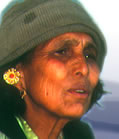 |
 |
||
 |
|||
|
RELATED THEMES communications development spiritual beliefs OTHER LOCAL THEMES BACKGROUND |
health
Reliance on a mixture of traditional and "western" medicine seems to be common, although older people prefer to be treated locally by traditional healers (Dhami Jhankri), and serious cases are usually sent to hospital. The expense of modern medicine is seen as one reason for using traditional remedies. One narrator says herbal medicines are used for "outside wounds" but not for "inside wounds", although the role of traditional healers extends beyond merely physical ailments. Another narrator is quite specific about different medical solutions for different illnesses, saying that heart disease and stomach pain are treated by Dhami Jhankri, while people suffering from boils, asthma or coughs are taken to hospital. Several older women stress how better access to health care and family planning has radically improved the lives of women: "Many of my children died. It was not because there wasn't enough to eat; they died before their time because they did not get medicines. Not like today. Now, they come routinely to give injections.People go for [contraception] after a couple of children. It's easy now" (Nepal 32). A traditional healer (Nepal 6) describes various "secret" remedies using herbs, leaves, grass, bark, buffalo dung and ash, which are passed down from one generation to another. Although he dismisses superstitious beliefs, he says that both healer and patient have to have faith for a cure to be effective, even within modern medicine. A herbal abortion-inducing remedy taught him by his grandmother is seen as important in relieving women of the burden of bearing too many children but he stresses that it can be dangerous unless the woman has a nutritious diet and the chance to rest. Healers speak of their concern that plants used in herbal remedies are being lost and they deplore the general ignorance of the value of such plants. The provision of medical facilities and of sanitation varies considerably between villages. Where there is no road link, women who cannot afford to be carried out risk dying in a difficult childbirth. The closure of a mission hospital because certain people complained about it being Christian is severely criticised in one account. One narrator claims that vaccination has eradicated smallpox and "almost eradicated" measles, with the result that child mortality has declined markedly. Trafficking is blamed for bringing HIV/AIDS into the region; development agencies are providing information about HIV prevention and former sex workers' warnings about the dangers are seen to be particularly effective. Nepal 30 is a compelling interview with a former prostitute; she gives detailed descriptions of the conditions she had to endure in the Indian brothels. quotes about health"Dhami Jhankri has sacrificed many goats and hens but I didn't see any improvement to the patient. Waste of money. But when you take sick people to the health post, they will diagnose it and give you medicines. More people have benefited from this." "Two daughters died after growing up. Three sons died young. Out of nine, five died. You know, they came down with fever and a bit of cough and would die like flies. Not like today. Now, they come routinely to give injections. In this village of ours, many people's children died like that... Some would simply wither and die. That's how it was in the old days. It's not like that now. It's not necessary to give birth to so many these days. People go for [contraception] after couple of children. It's easy now. It is good to do it." "We never knew anything about HIV/AIDS [in the brothels]. We knew that we could get pregnant having sex without a condom. We didn't know about other things. What seems to be done there is that those with a disease like that are sent home. I asked two, three friends of mine what happens to girls with AIDS. They are not kept here, they said. They said they are sent home." "When we cut our hand or leg we can use jardibuti. We can find jardibuti in the jungle we also use jardibuti to cure for broken hands and legs. We have to mix many jardibuti to make a paste for broken hands and legs. I don't know it all. They will mix many plants of jardibuti and make a liquid and put onto the broken spot and cover it with the bandage. After one week they will open it. It will be healed. I had seen many more like this cases which were healed later. So they can cure outside the wound but not the inside." "Before everything was pure and fresh, we didn't travel much and exchange of goods was also limited. But now people travel more, they take and bring things from one place to another. So, if any diseased element was brought here it spread the disease all over and some disease nobody knows how it spread here." "Once my second wife was also pregnant and when the delivery time came she found out that the baby was dead, because the baby was not moving at all for three days, so she was afraid she might die too. After she came home she had the labour pain but the dead baby could not come out. In Bhutan I had seen a doctor treating the same kind of case and I still remembered what he had done. I leaned back and put my wife between my legs and squeezed her stomach by my knees, the dead baby was really very big but finally it came out." |
|